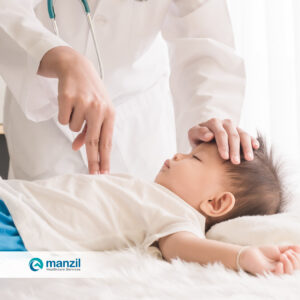How to Spot Sinusitis in Your Child


The sinuses are air-filled pockets around the nose and face that are lined with mucus membranes. When those membranes become swollen or inflamed, it can lead to sinusitis.
The most common causes of sinus inflammation are colds, allergies and environmental irritants (like secondhand smoke, which has been shown to negatively affect children’s health). The sinus membranes swell and make more mucus, which can get trapped in the sinuses. Bacteria, viruses, or fungi can then grow, resulting in a sinus infection.
Adults often associate sinus infections with headaches. But this isn’t the case for young children. The pair of sinuses located in the forehead don’t develop until around age 7. And the deeper sinuses behind the nose don’t appear until adolescence. Here are some signs that a child might have a sinus infection:
- Cold-like symptoms that don’t go away after 10 days.
- Cold-like symptoms that get worse after 7 days.
- Fever that begins 7-10 days after the cold symptoms begin.
- Foul breath.
- Dental, cheek, or ear pain.
- Allergy symptoms that are not relieved with the usual medication.
If your child is diagnosed with a sinus infection, your pediatrician may or may not prescribe an antibiotic. Don’t be surprised if your pediatrician recommends a “wait and see” approach for 72 hours before prescribing antibiotics. If your child is given an antibiotic, a 10-14 day course is usually prescribed.
Acetaminophen, ibuprofen, or warm compresses may help with pain. Some doctors will recommend decongestants or antihistamines, but over-the-counter cold medications are not recommended.
Talk to your doctor if your child gets frequent sinus infections. It could be a sign of another problem such as allergies, abnormal adenoids, or even a tooth infection.
Sinusitis is not contagious, but the colds that often cause them are. So it’s important to encourage good habits, like hand washing and covering the mouth for a cough or sneeze. Using a humidifier during dry weather can also help prevent sinuses from getting irritated. Just remember to clean the humidifier daily to prevent mold.
Sources:
- KidsHealth.org
- Sinusitis.
Boston Children’s Hospital - Sinusitis.
Centers for Disease Control and Prevention - Get Smart: Know When Antibiotics Work: Sinus Infection (Sinusitis).
Clinical Practice Guideline for the Diagnosis and Management of Acute Bacterial Sinusitis in Children Aged 1 to 18 Years - Pediatrics.
Powered by Bundoo®












































